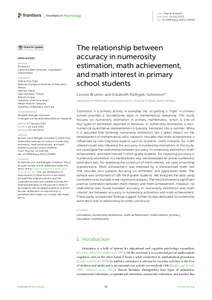| dc.date.accessioned | 2023-07-25T06:32:53Z | |
| dc.date.available | 2023-07-25T06:32:53Z | |
| dc.date.issued | 2023-07-10 | |
| dc.identifier | doi:10.17170/kobra-202307218434 | |
| dc.identifier.uri | http://hdl.handle.net/123456789/14923 | |
| dc.description.sponsorship | Gefördert durch den Publikationsfonds der Universität Kassel | ger |
| dc.language.iso | eng | |
| dc.rights | Namensnennung 4.0 International | * |
| dc.rights.uri | http://creativecommons.org/licenses/by/4.0/ | * |
| dc.subject | estimation | eng |
| dc.subject | numerosity estimation | eng |
| dc.subject | math achievement | eng |
| dc.subject | math interest | eng |
| dc.subject | primary education | eng |
| dc.subject | mathematics | eng |
| dc.subject.ddc | 370 | |
| dc.subject.ddc | 510 | |
| dc.title | The relationship between accuracy in numerosity estimation, math achievement, and math interest in primary school students | eng |
| dc.type | Aufsatz | |
| dcterms.abstract | Estimation is a primary activity in everyday life, so getting it “right” in primary school provides a foundational basis in mathematical reasoning. This study focuses on numerosity estimation in primary mathematics, which is one of four types of estimation reported in literature. In numerosity estimation, a non-numerical quantitative representation is typically translated into a number. While it is assumed that fostering numerosity estimation has a great impact on the development of mathematical skills, research indicates that math achievement is influenced by non-cognitive aspects such as students’ math interests. So, math interest could also influence the accuracy in numerosity estimation. In this study, we investigate the relationship between accuracy in numerosity estimation, math achievement, and math interest in third-grade students. For capturing accuracy in numerosity estimation in a standardized way, we developed an online numerosity estimation test. For assessing the construct of math interest, we used an existing questionnaire. Math achievement was assessed by a standardized math test that includes two subtests focusing on arithmetic and application tasks. The sample was comprised of 185 third-grade students. We analyzed the data using correlation and multiple linear regression analysis. The results showed a significant positive correlation between math interest and math achievement. However, no relationship was found between accuracy in numerosity estimation and math interest nor between accuracy in numerosity estimation and math achievement. These partly unexpected findings suggest further studies dedicated to numerosity estimation and its relationship to other constructs. | eng |
| dcterms.accessRights | open access | |
| dcterms.creator | Brumm, Leonie | |
| dcterms.creator | Rathgeb-Schnierer, Elisabeth | |
| dc.relation.doi | doi:10.3389/fpsyg.2023.1146458 | |
| dc.subject.swd | Grundschule | ger |
| dc.subject.swd | Grundschulkind | ger |
| dc.subject.swd | Mathematik | ger |
| dc.subject.swd | Leistung | ger |
| dc.subject.swd | Zahlenverständnis | ger |
| dc.subject.swd | Genauigkeit | ger |
| dc.type.version | publishedVersion | |
| dcterms.source.identifier | eissn:1664-1078 | |
| dcterms.source.journal | Frontiers in Psychology | eng |
| dcterms.source.volume | Volume 14 | |
| kup.iskup | false | |


